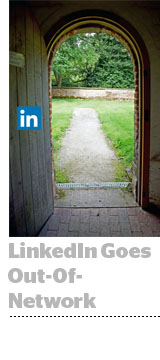
LinkedIn on Wednesday launched the LinkedIn Audience Network, a platform enabling advertisers to serve sponsored content on sites and apps beyond the main LinkedIn site.
These properties include desktop placements on MSN and Outlook.com, as well as third-party publishers through integrations to exchanges like MoPub, Google’s AdX, Rubicon and Sharethrough.
LinkedIn hopes to increase ad revenue while giving marketers more opportunities to hit reach, ROI and impression goals. For now, LinkedIn Audience Network is limited to sponsored content.
“Over the past year, our content teams have been investing in improving long-form publishing on our platform with the goal of diversifying content created on LinkedIn versus content we get from third parties,” said Divye Raj Khilnani, group product manager for sponsored content at LinkedIn.
“We’ve always tried to strike a balance when it comes to content – [either] organic or [monetized].”
To ensure traffic quality, LinkedIn curated a whitelist of desktop publishers it deemed brand-safe. For mobile apps, LinkedIn is working with its exchange partners to block certain ad ID categories – like dating and gaming – which aren’t relevant to its B2B audience.
Although LinkedIn isn’t working with any ad verification partners yet, Khilnani said the company has invested in engineering its own anti-fraud solutions that only serve ads on quality content.
“There are checks and balances in place to ensure the ads from our advertisers serve in the right context on publisher sites and apps,” he added.
Six thousand advertisers took part in LinkedIn Audience Network’s early beta. Advertisers achieved on average 3% to 13% lift in unique impressions served, with up to an 80% increase in unique clicks.
Some advertisers saw up to four times higher engagement for ads served via the LinkedIn Audience Network versus not.
Although LinkedIn has flirted with off-platform ad serving through its Bizo acquisition and products like Lead Accelerator, that solution was sunsetted to prioritize sponsored products.
“When we bought Bizo, we got expertise and relationships in the ad exchange and ad network business, but that was more of a starting point to influence our strategy,” Khilnani said. “We wanted to think about [audience network] with a fresh perspective around where the industry is going – which is mobile and native.
This post was syndicated from Ad Exchanger.

More Stories
By the Book: How ‘The Fugitive’ Director and an Investigative Journalist Collaborated on 2024’s Timeliest Thriller
The Best Holiday Ads of 2024
The Year in Ratings: How the Major News Outlets Performed in 2024